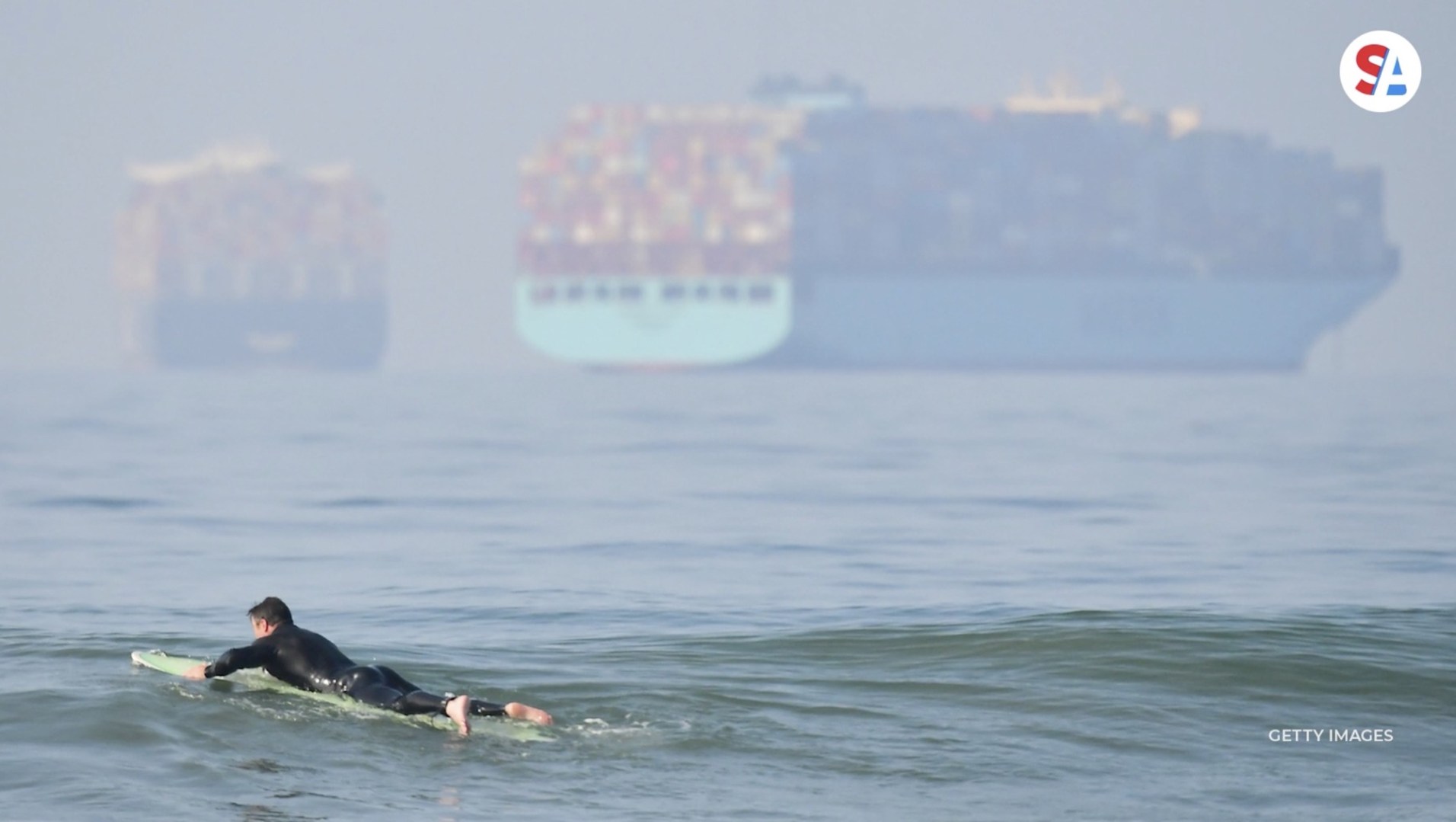
SIMONE DEL ROSARIO: LOS ANGELES IS KNOWN FOR ITS TRAFFIC, BUT THIS IS A TRAFFIC JAM OF EPIC PROPORTIONS.
GENE SEROKA: CARGO COMING HERE TO THE PORT IS LIKE TAKING 10 LANES OF FREEWAY TRAFFIC AND COMPRESSING THEM INTO FIVE.
SIMONE DEL ROSARIO: THE DELAYS MEAN SANTA COULD BE LATE THIS YEAR.
THE SEA PORTS IN SOUTHERN CALIFORNIA HANDLE ABOUT 40% OF ALL U.S. CONTAINER IMPORTS, BUT A LOGJAM THERE IS LEAVING DOZENS OF SHIPS STUCK AT SEA, WAITING MORE THAN A WEEK TO DOCK AND UNLOAD.
AS THE BOTTLENECK WORSENS AT AMERICA’S BUSIEST PORT COMPLEX, BRACE YOURSELF FOR A CHRISTMAS CRUNCH.
PATRICK PENFIELD: IT’S GOING TO BE A BIG ISSUE AS THE HOLIDAY SEASON PROGRESSES.
SIMONE DEL ROSARIO: PATRICK PENFIELD IS A PROFESSOR OF SUPPLY CHAIN PRACTICE AT SYRACUSE UNIVERSITY. HE SAYS PROBLEMS THROUGHOUT THE GLOBAL SUPPLY CHAIN COULD MEAN BARE SHELVES FOR THE HOLIDAYS.
COVID OUTBREAKS AT ASIA’S PORTS, CONGESTION AT SEA AND A TRUCKER SHORTAGE ARE ALL SPEED BUMPS FOR GETTING TOYS, ELECTRONICS AND MORE INTO STORES AND UNDER YOUR TREE.
AT THE SAME TIME, CONSUMER DEMAND FOR IMPORTS IS SURGING AND SO ARE PRICES.
ACCORDING TO THE FREIGHT-TRACKING FIRM FREIGHTOS, ONE 40-FOOT CONTAINER NOW COSTS $20,000 TO SHIP FROM CHINA TO THE U.S. THAT’S FOUR TIMES WHAT IT COST JUST ONE YEAR AGO.
AND IT’S TAKING 73 DAYS TO GET PRODUCT TO ITS FINAL DESTINATION, NEARLY DOUBLE THE TIME IT TOOK BEFORE THE PANDEMIC.
SOME BIG BOX STORES, LIKE COSTCO, WALMART AND HOME DEPOT, ARE CHARTERING THEIR OWN SHIPS TO TRY TO CUT DOWN ON COSTS AND DELAYS.
PATRICK PENFIELD: BUT YOUR SMALLER RETAILERS JUST DON’T HAVE THAT SIZE OR ECONOMIES OF SCALE TO BE ABLE TO DO SOMETHING LIKE THAT.
SIMONE DEL ROSARIO: HIGHER PRICES AND HARDER TO GET ITEMS ARE WHAT EXPERTS SAY TO EXPECT THIS HOLIDAY SEASON. WHILE IT’S PROBABLY TOO EARLY FOR HOLIDAY MUSIC, HOLIDAY SHOPPING CAN’T WAIT.
PENFIELD SAYS TO BUY EARLY AND BUY GIFT CARDS.
PATRICK PENFIELD: I DO THINK THERE’LL BE A LOT OF GOOD SALES IN JANUARY AND FEBRUARY ONCE THE FREIGHTERS, THE WHOLE BOTTLENECK GETS HOPEFULLY UNDONE.
SIMONE DEL ROSARIO: DO SHIPPING DELAYS HAVE YOU RUSHING TO DO YOUR HOLIDAY SHOPPING EARLY? LET ME KNOW IN THE COMMENTS.










